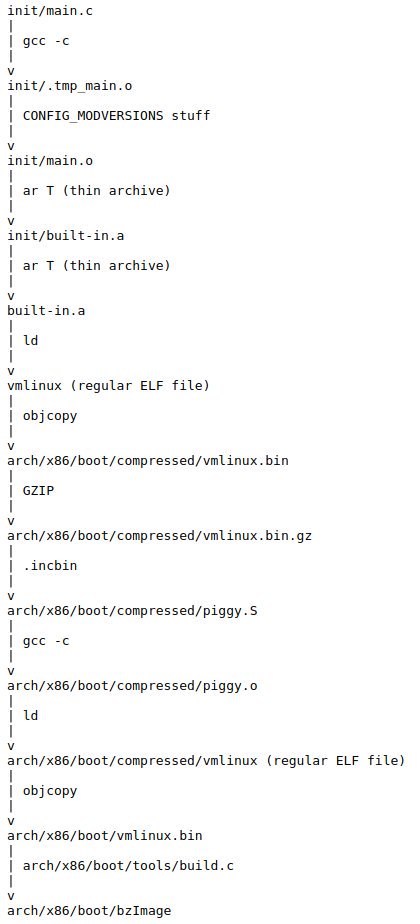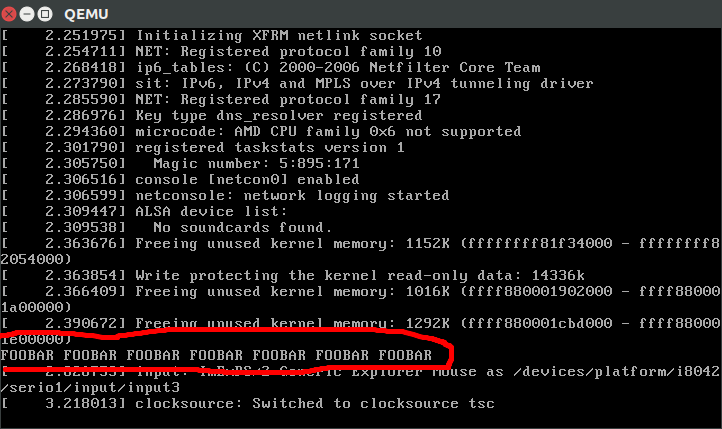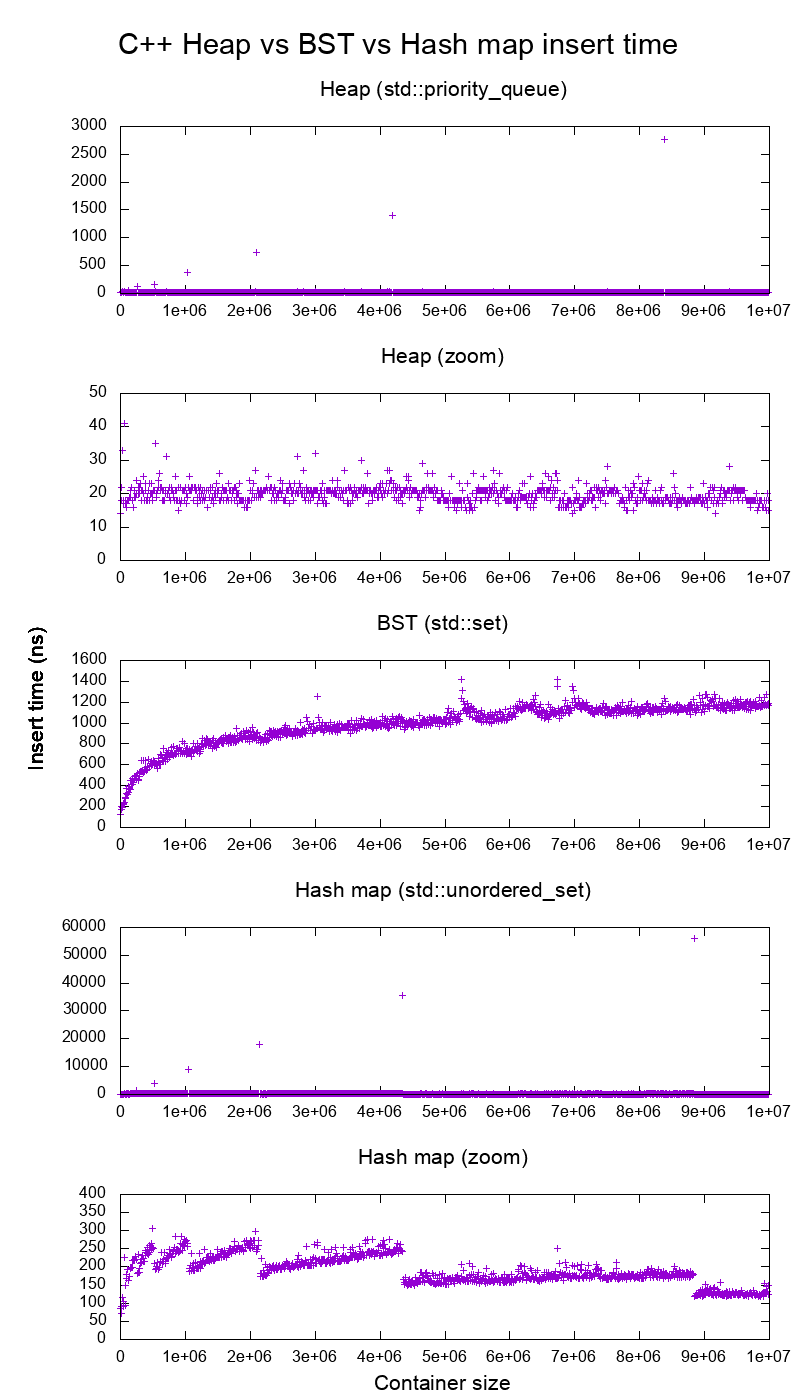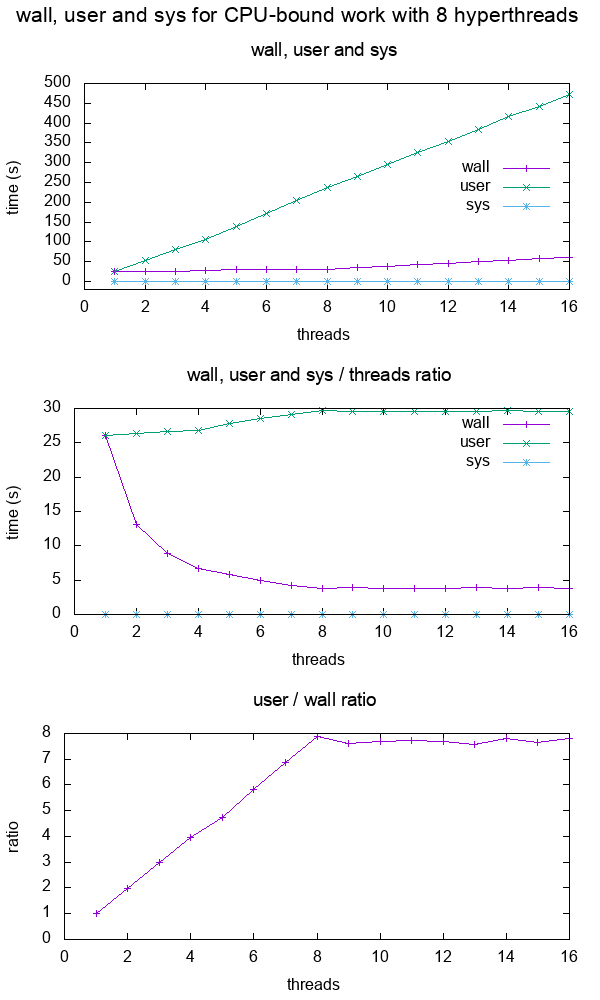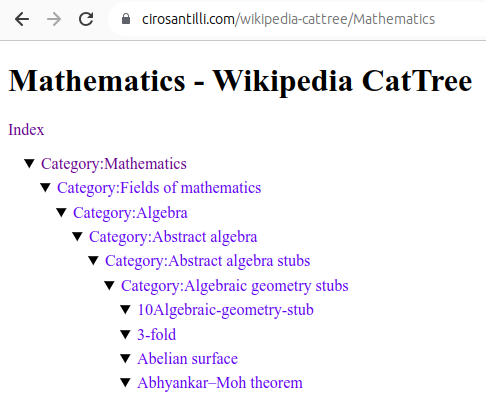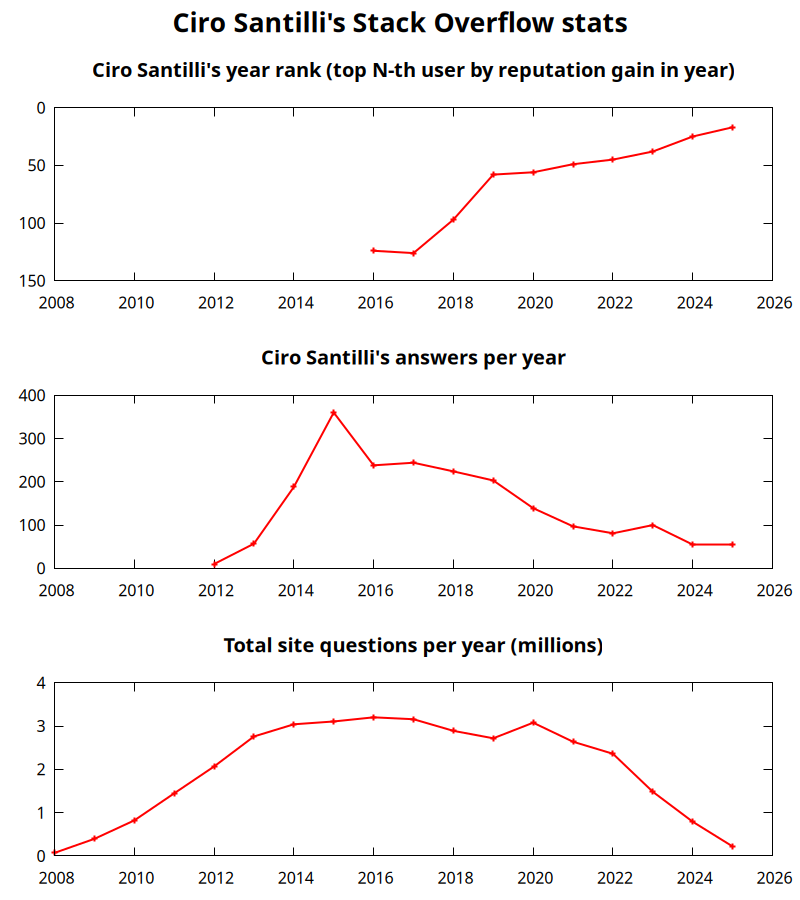The best articles by Ciro Santilli Updated 2025-07-16
These are the best articles ever authored by Ciro Santilli, most of them in the format of Stack Overflow answers.
Ciro posts update about new articles on his Twitter accounts.
Some random generally less technical in-tree essays will be present at: Section "Essays by Ciro Santilli".
- Trended on Hacker News:
- CIA 2010 covert communication websites on 2023-06-11. 190 points, a mild success.
- x86 Bare Metal Examples on 2019-03-19. 513 points. The third time something related to that repo trends. Hacker news people really like that repo!
- again 2020-06-27 (archive). 200 points, repository traffic jumped from 25 daily unique visitors to 4.6k unique visitors on the day
- How to run a program without an operating system? on 2018-11-26 (archive). 394 points. Covers x86 and ARM
- ELF Hello World Tutorial on 2017-05-17 (archive). 334 points.
- x86 Paging Tutorial on 2017-03-02. Number 1 Google search result for "x86 Paging" in 2017-08. 142 points.
- x86 assembly
- What does "multicore" assembly language look like?
- What is the function of the push / pop instructions used on registers in x86 assembly? Going down to memory spills, register allocation and graph coloring.
- Linux kernel
- What do the flags in /proc/cpuinfo mean?
- How does kernel get an executable binary file running under linux?
- How to debug the Linux kernel with GDB and QEMU?
- Can the sys_execve() system call in the Linux kernel receive both absolute or relative paths?
- What is the difference between the kernel space and the user space?
- Is there any API for determining the physical address from virtual address in Linux?
- Why do people write the
#!/usr/bin/envpython shebang on the first line of a Python script? - How to solve "Kernel Panic - not syncing: VFS: Unable to mount root fs on unknown-block(0,0)"?
- Single program Linux distro
- QEMU
- gcc and Binutils:
- How do linkers and address relocation works?
- What is incremental linking or partial linking?
- GOLD (
-fuse-ld=gold) linker vs the traditional GNU ld and LLVM ldd - What is the -fPIE option for position-independent executables in GCC and ld? Concrete examples by running program through GDB twice, and an assembly hello world with absolute vs PC relative load.
- How many GCC optimization levels are there?
- Why does GCC create a shared object instead of an executable binary according to file?
- C/C++: almost all of those fall into "disassemble all the things" category. Ciro also does "standards dissection" and "a new version of the standard is out" answers, but those are boring:
- What does "static" mean in a C program?
- In C++ source, what is the effect of
extern "C"? - Char array vs Char Pointer in C
- How to compile glibc from source and use it?
- When should
static_cast,dynamic_cast,const_castandreinterpret_castbe used? - What exactly is
std::atomicin C++?. This answer was originally more appropriately entitled "Let's disassemble some stuff", and got three downvotes, so Ciro changed it to a more professional title, and it started getting upvotes. People judge books by their covers. notmain.o 0000000000000000 0000000000000017 W MyTemplate<int>::f(int) main.o 0000000000000000 0000000000000017 W MyTemplate<int>::f(int)Code 1.. From: What is explicit template instantiation in C++ and when to use it?nmoutputs showing that objects are redefined multiple times across files if you don't use template instantiation properly
- IEEE 754
- What is difference between quiet NaN and signaling NaN?
- In Java, what does NaN mean?
Without subnormals: +---+---+-------+---------------+-------------------------------+ exponent | ? | 0 | 1 | 2 | 3 | +---+---+-------+---------------+-------------------------------+ | | | | | | v v v v v v ----------------------------------------------------------------- floats * **** * * * * * * * * * * * * ----------------------------------------------------------------- ^ ^ ^ ^ ^ ^ | | | | | | 0 | 2^-126 2^-125 2^-124 2^-123 | 2^-127 With subnormals: +-------+-------+---------------+-------------------------------+ exponent | 0 | 1 | 2 | 3 | +-------+-------+---------------+-------------------------------+ | | | | | v v v v v ----------------------------------------------------------------- floats * * * * * * * * * * * * * * * * * ----------------------------------------------------------------- ^ ^ ^ ^ ^ ^ | | | | | | 0 | 2^-126 2^-125 2^-124 2^-123 | 2^-127Code 2.Visualization of subnormal floating point numbers vs what IEEE 754 would look like without them. From: What is a subnormal floating point number?
- Computer science
- Algorithms
Figure 5. Average insertion time into heaps, binary search tree and hash maps of the C++ standard library. Source. From: Heap vs Binary Search Tree (BST)
- Is it necessary for NP problems to be decision problems?
- Polynomial time and exponential time. Answered focusing on the definition of "exponential time".
- What is the smallest Turing machine where it is unknown if it halts or not?. Answer focusing on "blank tape" initial condition only. Large parts of it are summarizing the Busy Beaver Challenge, but some additions were made.
- Algorithms
- Git
| 0 | 4 | 8 | C | |-------------|--------------|-------------|----------------| 0 | DIRC | Version | File count | ctime ...| 0 | ... | mtime | device | 2 | inode | mode | UID | GID | 2 | File size | Entry SHA-1 ...| 4 | ... | Flags | Index SHA-1 ...| 4 | ... |Code 3.ASCII art depicting the binary file format of the Git index file. From: What does the git index contain EXACTLY?tree {tree_sha} {parents} author {author_name} <{author_email}> {author_date_seconds} {author_date_timezone} committer {committer_name} <{committer_email}> {committer_date_seconds} {committer_date_timezone} {commit message}Code 4.Description of the Git commit object binary data structure. From: What is the file format of a git commit object data structure?- How do I clone a subdirectory only of a Git repository?
- Python
- Web technology
- OpenGL
Figure 7. OpenGL rendering output dumped to a GIF file. Source. From: How to use GLUT/OpenGL to render to a file?- What are shaders in OpenGL?
- Why do we use 4x4 matrices to transform things in 3D?
Figure 10. Sinusoidal circular wave heatmap generated with an OpenGL shader at 60 FPS on SDL. Source.
- Node.js
- Ruby on Rails
- POSIX
- What is POSIX? Huge classified overview of the most important things that POSIX specifies.
- Systems programming
- What do the terms "CPU bound" and "I/O bound" mean?
Figure 12. Plot of "real", "user" and "sys" mean times of the output of time for CPU-bound workload with 8 threads. Source. From: What do 'real', 'user' and 'sys' mean in the output of time?+--------+ +------------+ +------+ | device |>---------------->| function 0 |>----->| BAR0 | | | | | +------+ | |>------------+ | | | | | | | +------+ ... ... | | |>----->| BAR1 | | | | | | +------+ | |>--------+ | | | +--------+ | | ... ... ... | | | | | | | | +------+ | | | |>----->| BAR5 | | | +------------+ +------+ | | | | | | +------------+ +------+ | +--->| function 1 |>----->| BAR0 | | | | +------+ | | | | | | +------+ | | |>----->| BAR1 | | | | +------+ | | | | ... ... ... | | | | | | +------+ | | |>----->| BAR5 | | +------------+ +------+ | | | ... | | | +------------+ +------+ +------->| function 7 |>----->| BAR0 | | | +------+ | | | | +------+ | |>----->| BAR1 | | | +------+ | | ... ... ... | | | | +------+ | |>----->| BAR5 | +------------+ +------+Code 5.Logical struture PCIe device, functions and BARs. From: What is the Base Address Register (BAR) in PCIe?
- Electronics
- Raspberry Pi
Figure 13. Raspberry Pi 2 directly connected to a laptop with an Ethernet cable. Image from answer to: How to hook up a Raspberry Pi via Ethernet to a laptop without a router?Figure 14. . Image from answer to: How to hook up a Raspberry Pi via Ethernet to a laptop without a router? Figure 15. . Image from answer to: How to emulate the Raspberry Pi 2 on QEMU? Figure 16. Bare metal LED blinker program running on a Raspberry Pi 2. Image from answer to: How to run a C program with no OS on the Raspberry Pi?
- Raspberry Pi
- Computer security
- Media
Video 2. Canon in D in C. Source.The original question was deleted, lol...: How to programmatically synthesize music?- How to resize a picture using ffmpeg's sws_scale()?
- Is there any decent speech recognition software for Linux? ran a few examples manually on
vosk-apiand compared to ground truth.
- Eclipse
- Computer hardware
- Scientific visualization software
Figure 17. VisIt zoom in 10 million straight line plot with some manually marked points. Source. From: Section "Survey of open source interactive plotting software with a 10 million point scatter plot benchmark by Ciro Santilli"
- Numerical analysis
- Computational physics
- Register transfer level languages like Verilog and VHDL
- Verilog:
Figure 19. . See also: Section "Verilator interactive example"
- Verilog:
- Android
Video 4. Android screen showing live on an Ubuntu laptop through ADB. Source. From: How to see the Android screen live on an Ubuntu desktop through ADB?
- Debugging
- Program optimization
- What is tail call optimization?
Figure 21. . Source. The answer compares gprof, valgrind callgrind, perf and gperftools on a single simple executable.
- Data
Figure 22. Mathematics dump of Wikipedia CatTree. Source. In this project, Ciro Santilli explored extracting the category and article tree out of the Wikipedia dumps.
- Mathematics
Figure 23. Diagram of the fundamental theorem on homomorphisms by Ciro Santilli (2020)Shows the relationship between group homomorphisms and normal subgroups.- Section "Formalization of mathematics": some early thoughts that could be expanded. Ciro almost had a stroke when he understood this stuff in his teens.
Figure 24. Simple example of the Discrete Fourier transform. Source. That was missing from Wikipedia page: en.wikipedia.org/wiki/Discrete_Fourier_transform!
- Network programming
- Physics
- What is the difference between plutonium and uranium?
Figure 25. Spacetime diagram illustrating how faster-than-light travel implies time travel. From: Does faster than light travel imply travelling back in time?
- Biology
Figure 26. Top view of an open Oxford Nanopore MinION. Source. From: Section "How to use an Oxford Nanopore MinION to extract DNA from river water and determine which bacteria live in it"Figure 27. Mass fractions in a minimal growth medium vs an amino acid cut in a simulation of the E. Coli Whole Cell Model by Covert Lab. Source. From: Section "E. Coli Whole Cell Model by Covert Lab"
- Quantum computing
- Section "Quantum computing is just matrix multiplication"
Figure 28. Visualization of the continuous deformation of states as we walk around the Bloch sphere represented as photon polarization arrows. From: Understanding the Bloch sphere.
- Bitcoin
- GIMP
Figure 29. GIMP screenshot part of how to combine two images side-by-side in GIMP?
- Home DIY
Figure 30. Total_Blackout_Cassette_Roller_Blind_With_Curtains.Source. From: Section "How to blackout your window without drilling"
- China
Ciro Santilli's Stack Overflow contributions Updated 2026-01-30
Ciro Santilli's Stack Overflow stats
. Data compiled for the plot: ciro-santilli-stack-overflow-stats.csv
- top obtained manually from pages such s=as: stackexchange.com/leagues/1/year/stackoverflow/2023-01-01
- answer count obtained with this Stack Exchange Data Explorer data.stackexchange.com/stackoverflow/query/433214/count-of-answers-by-user-over-time?UserId=895245
- total questions obtained with: data.stackexchange.com/stackoverflow/query/1926608/total-questions-asked-per-year-on-stack-overflow
Plot generated with gnuplot with ciro-santilli-stack-overflow-stats.gnuplot
Ciro Santilli's Stack Overflow contributions have, unsurprisingly, centered around the subjects he has worked with: systems programming and web development, and necessary tooling to get those done, such as Git, Python, Bash and Ubuntu.
His best answers are listed at: Section "The best articles by Ciro Santilli".
Stack Overflow has been the initial centerpiece of Ciro Santilli's campaign for freedom of speech in China, until Ciro noticed that GitHub might be potentially even more effective for it.
In Stack Overflow Ciro likes to:
- answer important questions found through Google which he needs to solve an actual problem he has right now, and for which none of the existing answers satisfied him, and close duplicates.
- monitor less known tags which very few people know a lot about and where the knowledge sharing desperately lacking, but in which Ciro specializes and therefore has some uncommon knowledge to share
In practice it also happens that Ciro:
- Googles for his own answers to remember some detail he wrote down but with slightly different terms that were closer to mind at the time, and find other similar questions for which he has the perfect answer.
- learns something new by chance, e.g. some new flashy feature of a new version of the C++ standard, thinks "this is awesome, there must be a Stack Overflow question for it", and then there is a question and he answers it
When he gets an upvote on one of his more obscure answers, Ciro often re-reads it, and often finds improvements to be made and makes them.
He doesn't like to refresh the homepage looking for easy reputation on widely known subjects. See also: online forums that lock threads after some time are evil.
The result is that Ciro ends up getting relatively a lot of reputation without much work! The term passive income, much beloved by fake investment gurus, comes to mind. But now it's "passive reputation"! And it is useless! Yay!
For this reason, Necromancer is Ciro's favorite badge (get 5 upvotes on a question older than 60 days), and as of July 2019, he became the #1 user with the most of this badge. Announcement on Twitter.
The number two at the time was VonC (see also: Section "Epic Stack Overflow users"), who had about 16 times more answers than Ciro in total! From this query: data.stackexchange.com/stackoverflow/query/1072396?&Date=2019-07-01&UserId=895245 it can be seen that as of July 2019, 1216 out of his 1329 answers were answered 60 days after the questions and constitute potential necromancers! Compare that to VonC's 1643 potential necromancers out of 21767 answers!
VonC eventually took back the lead in 2022, dude's a machine!!! twitter.com/cirosantilli/status/1546389532014247936
Someone at Ciro's work once said something along:and this does ring true in Stack Overflow as well. When you are answering stuff, it means that you either didn't know, or that the information wasn't well available, and so your specific application is progressing slowly because of that. Once the generic prerequisites are well solved and answered, you will spend much more time on your business specific things rather than anything else that can be factored out across projects, and so you will get more "directly useful work" done, and less Stack Overflow answers. Of course, without the prior research in place, you can't get the final product done either.
In terms of per year reputation ranks, Ciro was in the top 100 in of the 2018 ranking with 38,710 reputation gained in that year: stackexchange.com/leagues/1/year/stackoverflow/2018-01-01?sort=reputationchange&page=4 (archive). He reached top 50 in 2022. Note that daily reputation is mostly capped to 200 per day, leading to a maximum 73000 per year. It is possible to overcome this limit either with bounties or accepts, and Ciro finds it amazing that some people actually break the 73k limit by far with accepts, e.g. Gordon Linoff reached 135k in 2018 (archive)! However, this is something that Ciro will never do, because it implies answering thousands and thousands of useless semi duplicate questions as fast as possible to get the accept. Ciro's reputation comes purely from upvotes on important question, and is therefore sustainable without any extra effort once achieved. Interestingly, Ciro appeared on top of the quarter SE rankings around 2019-11: web.archive.org/web/20191112100606/https://stackexchange.com/leagues but it was just a bug ;-)
There is no joy like answering an old question, and watching your better answer go up little by little until it dominates all others.
Stack Overflow reputation is of course, in itself, meaningless. People who contribute to popular subjects like web development will always have infinitely more reputation than those that contribute to low level subjects.
What happens on the specialized topics though is that you end up getting to know all the 5 users who contribute 95% of the content pretty soon as you study those subjects.
Like everything that man does, the majority of Ciro's answers are more or less superficial subjects that many people know but few have the patience to explain well, or they are updates to important questions reflecting upstream developments. But as long as they save 15 minutes from someone's life, that's fine.
There is great beauty when you are involved in a programming problem, and you suddenly remember: wait, I answered something related a few years ago! And especially so when you can go back and improve your old answer with new insight. This has great value, because when you were more newbie, you would have typed different words into Google Search than you would now. So by updating posts from when you were a newbie, you are helping other newbies more, as they are more likely to be also searching for those keywords. It is also very nice to have some head start on the answer's upvote count and not have to bootstrap yet another answer from 0 upvotes and have to go through all the competition!
For example, Ciro's most upvoted answer as of July 2019 is stackoverflow.com/questions/18875674/whats-the-difference-between-dependencies-devdependencies-and-peerdependencies/22004559#22004559 was written when he spent his first week playing with NodeJS (he was having a look at Overleaf, later merged into Overleaf, for education), which he didn't touch again for several years, and still hasn't "mastered" as of 2019! This did teach a concrete life lesson to Ciro however: it is impossible to know what is the most useful thing you can do right now very precisely. The best bet is to follow your instincts and do as much awesome stuff as you can, and then, with some luck, some of those attempts will cover an use case.
Ciro tends to take most pride on his systems programming answers, which is a subject that truly relatively few people know about. He likes it when he goes insanely deep into a subject, way beyond what OP had in mind, exposing full root causes and broader causes, see e.g.:
- stackoverflow.com/questions/1778538/how-many-gcc-optimization-levels-are-there/30308151#30308151
- stackoverflow.com/questions/34519521/why-does-gcc-create-a-shared-object-instead-of-an-executable-binary-according-to/55704865#55704865
- stackoverflow.com/questions/8352535/how-does-kernel-get-an-executable-binary-file-running-under-linux/31394861#31394861
Ciro also derives great joy from his "media related answers" (3D graphics, audio, video), which are immensely fun to write, and sometimes borderline art, see answers such as those under "OpenGL" and "Media" under the best articles by Ciro Articles or even simpler answers such as:
Figure 3. Ciro knows how to convert videos to GIFs.- Stereo "tone-generator" for linux?, related: FFmpeg sound synthesis
There is something of greater value in perfectly presented technical knowledge, that goes beyond than simply getting something done. The pleasure of understanding and mastering something, and perhaps of the explanation itself. Sometimes when answering, Ciro feels like a tailor, where ASCII is his cloth. See also: Section "The art of programming", Section "Physics and the illusion of life".
Ciro's deep understanding of Stack Overflow mechanisms and its shortcomings also helped shape his ideas for: OurBigBook.com. So it is a bit funny to think that after all time Ciro spent on the website, he actually wants to destroy it and replace it with something better. There can be no innovation without some damage. It also led to Ciro's creation of Stack Overflow Vote Fraud Script.
After answering so many questions, he ended up converging to a more or less consistent style, which he formalized at:Like any other style guide, this answer style guide, once fully incorporated and memorized, allows Ciro to write answers faster, without thinking about formatting issues.
- meta.stackexchange.com/questions/18614/style-guide-for-questions-and-answers/326746#326746. Key self-quote:
- meta.stackexchange.com/questions/10647/how-do-i-write-a-good-title/311903#311903. Question title style only. After a few years later more people agreeing with that post which now had -12 votes: meta.stackoverflow.com/questions/422082/should-we-add-option-use-complete-sentences-to-first-answers-queue
Ciro also made a question title style guide: meta.stackexchange.com/questions/10647/how-do-i-write-a-good-title/311903#311903 but for some reason the Stack Overflow community prefers their semi-defined title meta-language to proper English. Go figure.
Ciro started contributing to Stack Overflow in 2012 when he was at École Polytechnique.
Like all things that end up shaping the course of one's life, Ciro started contributing without thinking too much about it.
His first answer was to the LaTeX question: Standalone diagrams with TikZ?, which reflects the fact that this happened while Ciro was reaching his Ciro Santilli's Open Source Enlightenment.
Ciro's first upvote was for his 2012 question: How to run a Python script portably without specifying its full path?
When he started contributing, Ciro was still a newbie. One early event he will never forget was when someone mentioned a "man page", and Ciro commented saying that there was a typo!
When Ciro reached 15 points and gained the ability to upvote, it felt like a major milestone, he even took a screenshot of the browser! 1k, 10k and 100k were also particularly exciting. When the 100k cup (archive) arrived in 2018, Ciro made a show-off Facebook post (archive). At some point though, your brain stops caring, and automatically filters out any upvotes you get except on the answers that you are really proud of and which don't yet have lots of upvotes. The last remaining useless gamed achievement that Ciro looked forward to was legendary (archive), and which he achieved on 2021-02-16.
Ciro Santilli with his Stack Overflow 100k reputation cup
. From the start, Ciro's motivations for contributing to Stack Overflow have been a virtuous circle of:
- save the world through free education
- It feels especially amazing when people in the real world start taking note of you, and either close friends tell you straight out that you're a Stack Overflow God, or as you slowly and indirectly find out that less close know or came to you due to your amazing contributions.
It is also amazing when you start having a repertoire of answers, and as you are writing a new answer, you remember: "hey, the knowledge of that answer would be so welcome here", and so you link to the other answer as well at the perfect point. This somewhat achieves does what OurBigBook.com aims to do: for each small section of a tutorial, gather the best answers by multiple people.
Another one is Aaron Hall, who is also very high on the necromancer list, answers in Python which is a topic Ciro cares about, and states on his profile:so another necromancer.
Follow me on Twitter and tell me what canonical questions you would like me to respond to!
Way to go.
Ciro also asks some questions on a ratio of about 1 question per 10 answers. But Ciro's questions tend to be about extremely niche that no one knows/cares about, and a high percentage of them ends up getting self answered either at asking time or after later research.
Some fun reactions to Ciro's Stack Overflow activity:
- Eric B comments[ref] on Ciro's answer to the question "What does multicore assembly language look like?":
Holy shit, Ciro made it his masters degree to write OP an answer. What a long and detailed answer, thanks!
Computer security Updated 2025-07-16
As mentioned at Section "Computer security researcher", Ciro Santilli really tends to like people from this area.
Also, the type of programming Ciro used to do, systems programming, is particularly useful to security researchers, e.g. Linux Kernel Module Cheat.
Eli Benderski Updated 2025-07-16
Homepage: eli.thegreenplace.net/
Also has many great contributions on Stack Overflow: stackoverflow.com/users/8206/eli-bendersky
As of 2016, Eli worked at Google (reference). TODO before that, I had found his earlier info previously but lost it.
Eli focuses mostly on compiler toolchains.
He also has some mathematics stuff, so cute: eli.thegreenplace.net/2015/change-of-basis-in-linear-algebra/
Epic Stack Overflow users Updated 2026-01-30
These are some users Ciro Santilli particularly respects, mostly due to their contributions to systems programming subjects:
- unix.stackexchange.com/users/885/gilles-so-stop-being-evil
- stackoverflow.com/users/379897/r-github-stop-helping-icea
- stackoverflow.com/users/196561/osgx
- stackoverflow.com/users/50617/employed-russian Employed Russian. Binutils, ELF, GDB, claims to work at Google. The only Russian sounding name on GDB and Binutils git log is that of Paul Pluzhnikov: www.linkedin.com/in/paul-pluzhnikov-61b9676/ and Employed Russian mentions one of his commits at: stackoverflow.com/questions/3718072/gdb-takes-too-long-and-ctrl-c-has-no-effect Ex physicist: www.researchgate.net/profile/Paul_Pluzhnikov
Ciro also really likes the following users, a bit less like Gods, and bit more like friends:
- partly because they were close by on the yearly reputation charts for a long time circa 2020, so it feels like they also focus on replying to important questions rather than answering new duplicates immediately:
- stackoverflow.com/users/642706/basil-bourque: GCC dev, but started replying lots of Java questions as of 2021 it seems for some reason
- stackoverflow.com/users/541136/aaron-hall: Python, NixOS and Haskell more and more it seems. Also pro freedom of speech, gotta love those religious liberal Republicans. Reminds Ciro of Ron Maimon very slightly, maybe it's just the New Yorkedneess. Ciro once met another intelligent dude who liked both Haskell and NixOS, there must be some correlation.
- VonC: Git God, VonC is just Super nice, gives clear credit to others, always positive interactions. Love this dude. He was the one that held the Necromancer record in 2019 before Ciro took it.
- Peter Cordes. An assembly maniac this one. And a really nice one too. Sometimes pedantic, but always nice, and always correct. He's been going into God level more and more it must be said:In 2024 VonC was found to have been used LLMs to generate part of his answers, and later publicly apologized: meta.stackoverflow.com/questions/430072/a-commitment-to-amend-and-move-forward It is not clear why he had used them though. He remained user #1 in 2025 however, even despite not using them anymore as far as it is known.
Other interesting people:
- stackoverflow.com/users/560648/lightness-races-in-orbit Lightness Races in Orbit. C++ God. Interesting aesthetics. Real name: Tom Lachecki, British, as per:As of 2023 marked "retired" from Stack Overflow, rep graph suggests since 2020.
- stackoverflow.com/users/3681880/suragch the number 3 necromancer dude. But then in 2022 he found God and mostly quit: suragch.medium.com/programming-was-my-god-89b625164a69
- www.reddit.com/r/webdev/comments/1ealv82/the_fall_of_stack_overflow/ The Fall of Stack Overflow
I shouldn't be doing this on funded OurBigBook time which is until the end of May, but I was getting too nervous and decided to start a casual job search to test the waters.
In particular I want to see if I can get past the HR lady step without toning down my online profiles. If nothing works out for the next round I'll be hiding anything too spicy like:Another interesting point is to see if French companies are more likely to reply given that Ciro Santilli studied at École Polytechnique which the French worship.
- prominently seeking funding for OurBigBook on my LinkedIn profile
- CIA 2010 covert communication websites references. This will be my first job hunt since I have published that article. Wish me luck.
- gay Putin profile picture on Stack Overflow
Gay Putin, currently used in Ciro Santilli's Stack Overflow profile
. Ciro's profiles may be a bit too much for the HR ladies who reject his job applications on the spot. To be fair, perhaps not enough years of experience for certain applications and job hopping may have something to do with it too. But since they don't ever tell you anything not to get sued, we'll never know.I'm looking in particular either for:
- machine learning-adjacent jobs in companies that seem to be doing something that could further AGI, e.g. automatic code generation or robotics would be ideal
- quantum computing
- systems programming, which is what I actually have work experience with
I spent the last two weeks doing that:
- one week browsing everything of interest in London and Paris and sending applications to anything that seemed both relevant and interesting. Maintaining an application list at: Section "Job application by Ciro Santilli".
- one week on a very laborious but somewhat interesting take home exercise for Linux kernel engineer a Canonical, makers of Ubuntu.I had a week to finish 5 practical coding and packaging questions, and I tried to do everything as perfectly as possible, but I somewhat underestimated the amount of work and wait needed to do everything and didn't manage to finish question 4 and missed 5. Oops let's see how that goes.At least this had a few good outcomes for the Internet as I tried to document things as nicely as I could where they were missing from Google as usual:
- I re-tested Linux Kernel Module Cheat and made some small improvements. Things still worked from a Ubuntu 24.10 host (using Docker to Ubuntu 22.04), and I also checked that kernel 6.8 builds and GDB step debugs after adding the newly required config
CONFIG_DEBUG_INFO_DWARF_TOOLCHAIN_DEFAULT, also mentioned that at: Why are there no debug symbols in my vmlinux when using gdb with /proc/kcore? - I contributed some simple updates to github.com/martinezjavier/ldd3 getting it closer to work on Linux kernel v6.8. That repository aims to keep the venerable examples from Linux kernel module book LDD3 alive on newer kernels, and is a very good source for kernel module developers.
- How to compile a Linux kernel module?: wrote a quick Ciro-approved tutorial
- Dynamic array in Linux kernel module: I gave an educational example of a dynamic byte array (like std::string) using the kvmalloc family of allocators
- quickemu: this is a good emulator manager and I think I'll be using it for Ubuntu images when needed from now on. I wrote:
- How to run Ubuntu desktop on QEMU?: an introductory tutorial to the software as their README is not that good as is often the case. It's hard for project authors to predict what new users want or not. This is my second answer to this question, the previous one focusing on a more manual approach without third party helpers.
- How to share folder between guest/host? (Quickemu): I explained how to setup a 9p mount to share a directory between guest and host
- Error :: You must put some 'source' URIs in your sources.list: updated this answer for Ubuntu 24.04. This issue comes up when you want to do either of:which don't work by default, and my answer explains how to do it from the GUI and CLI. The CLI method is specially important for Docker images. Since Ubuntu doesn't offer a stable CLI method for this, the method breaks from time to time and we have to find the new config file to edit.
sudo apt build-dep sudo apt source - What is hardware enablement (HWE)?: I learned a bit better how Ubuntu structures its kernel releases for each Ubuntu release
Some of the main issues I had were:- compiling Linux kernel for Ubuntu is extremely slow. I was used to compiling for embedded system with Buildroot, which finishes in minutes, but for Ubuntu is hours, presumably because they enable as many drivers as possible to make a single ISO work on as many different computers as possible, which makes sense, but also makes development harder
- my QEMU setup for Ubuntu was not quite as streamlined and I relearned a few things and set up quickemu. By chance I had recently come across quickemu for testing OurBigBook on MacOS, but I had to learn a bit how to set it up reasonably too
- I re-tested Linux Kernel Module Cheat and made some small improvements. Things still worked from a Ubuntu 24.10 host (using Docker to Ubuntu 22.04), and I also checked that kernel 6.8 builds and GDB step debugs after adding the newly required config

